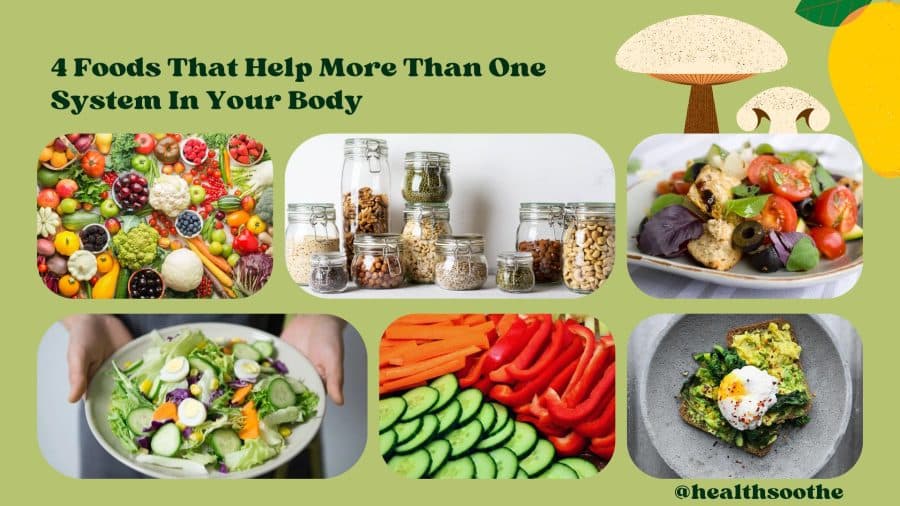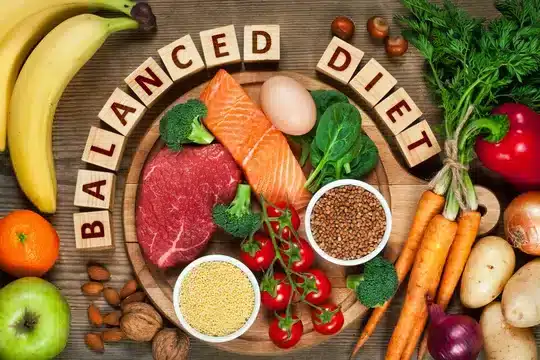You, indeed, become what you eat. If you observe a healthy diet, you’ll be fit and strong, and suffer from fewer infections and illnesses. Healthy foods help children grow well and women produce healthy babies. This is why eating certain foods is essential to keep your body at its optimum.
Here are foods that target more than one system in your body, promoting a more holistic health:
1. Fruits And Vegetables
A diet rich in fruits and vegetables means you’ll be able to consume significant amounts of essential minerals, such as fiber, potassium, iron, and phytonutrients.
Phytonutrients help reduce the risk of diabetes, heart disease, and certain cancers. Fiber helps improve gut health and promote weight loss. Potassium helps control blood pressure and reduce the risk of heart disease. Iron is an essential mineral that helps transport oxygen in red blood cells.
When it comes to fruits, one of your healthiest options would be avocado. It’s a great source of healthy fat, as well as vitamins C, K, and B6. Healthy fat helps increase high-density lipoprotein or good cholesterol, which helps remove bad cholesterol from the body. Such components help regulate mood, improve brain health, and reduce depression symptoms. Avocado also contains beta-sitosterol, which helps improve your heart health. Moreover, it also contains lutein and zeaxanthin, which offer antioxidant protection to the eye to minimize UV light damage.
You can include fruits and vegetables in your diet in a lot of ways, one of which is by incorporating them into oatmeal. Some tasty and healthy fruits you can mix with oatmeal include blueberries, strawberries, apples, melons, peaches, bananas, and mangoes. If you want to make sure you’re consuming high-quality and fresh oatmeal, you may visit sites such as Proper Good for some guidelines.
2. Nuts And Seeds
Nuts and seeds are among the healthiest foods to include in your diet. They’re high in healthy fat, amino acids, dietary protein, and fiber, which help maintain weight, and prevent diabetes and heart disease. Examples of nuts include almonds, cashew nuts, walnuts, peanuts, macadamias, and Brazil nuts. Meanwhile, examples of seeds include pumpkin seeds, chia seeds, sunflower seeds, poppy seeds, flaxseeds, and psyllium seeds.
Almonds, in particular, contain antioxidants that prevent oxidative stress, which is associated with inflammation, aging complications, and chronic diseases, like cancer and heart disease. Almonds are also packed with vitamin E, which helps improve vision, reproduction, and brain health. Finally, almonds contain healthy fat that helps reduce bad cholesterol, which is associated with heart disease.
Meanwhile, pumpkin seeds are packed with antioxidants, like carotenoids and vitamin E, which help reduce inflammation and protect cells from free radicals, as well as help maintain healthy testosterone levels. They also have high levels of magnesium, which help maintain healthy bones, and control blood pressure and sugar levels. Furthermore, they have high levels of zinc that help improve sperm quality in men.
3. Fish
Fish is among the healthiest foods in the world. The best options include tuna, salmon, mackerel, cod, trout, sardines, crab, perch, herring, and haddock. They’re rich in omega-3 fatty acids and protein, as well as iodine, calcium, phosphorus, magnesium, and vitamins D and B2.
Omega-3 fatty acids help in the production of prostaglandin hormones, which control blood clotting and inflammation. Secondly, they’re able to navigate the brain cell membrane easily, thus, interacting with mood molecules in the brain. This has an inflammatory effect, which may help with depression. Finally, omega-3 fatty acids are associated with improved vision, as well as lowered risk of heart disease and cancer.
Fish also contains vitamin D, which helps regulate calcium and phosphorus in the body. These nutrients help maintain healthy muscles and bones. In addition, it may also help alleviate depression and reduce weight.
4. Water
Water is another important aspect that shouldn’t be left out of your diet; it keeps every system in your body functioning properly.
Not drinking enough water leads to dehydration, which causes weakness, dizziness, confusion, and low blood pressure, among others. So, how much water should you drink? A rule of thumb is to drink four to six cups daily. However, you’re bound to take more if you exercise, take medications, or have health conditions, such as heart disease, thyroid disease, or kidney or liver issues.
The benefits of water in your body include transporting essential minerals, nutrients, and oxygen to your cells. Water also aids in digestion, prevents constipation, aids in joint lubrication, regulates body temperature, optimizes blood pressure, promotes weight loss, flushes bacteria out of your bladder, and reduces the risk of kidney stones. Therefore, ensure you drink enough water every day.
Conclusion
The foods above provide numerous benefits to various parts of your body. Therefore, it’s essential to incorporate such options into your diet to ensure holistic health. Also, remember that eating these foods don’t have to be boring; you can whip up your own delicious recipes, so long as you get a sufficient dose of the right nutrients and minerals.




